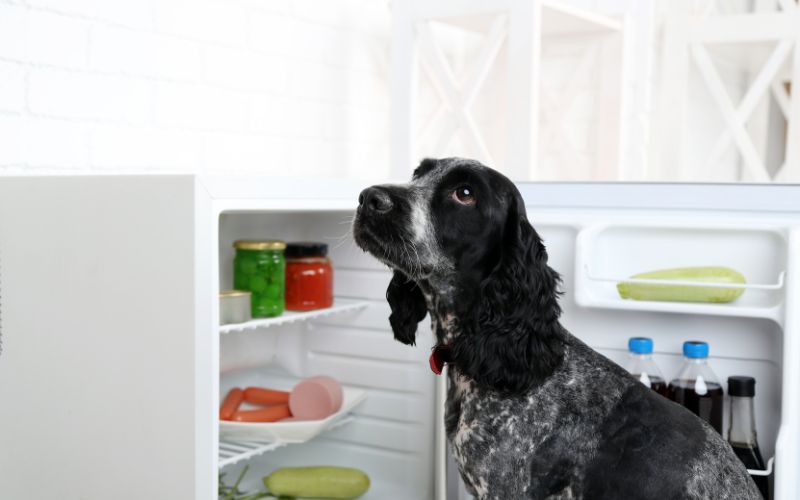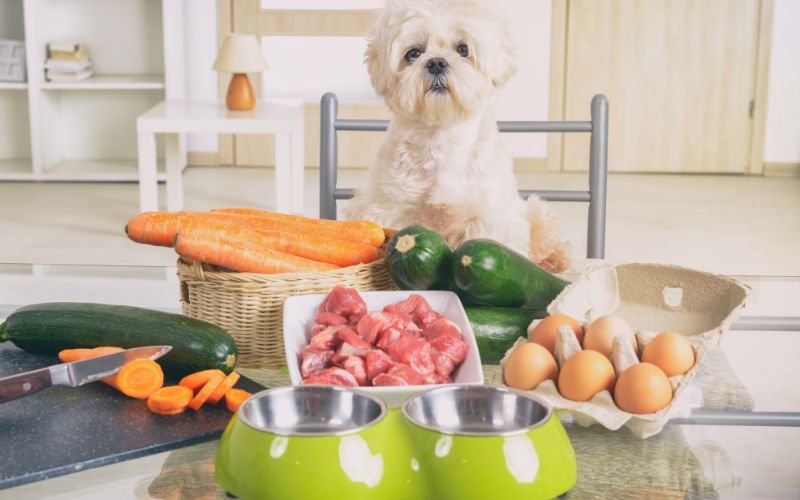Real, living food will always be the best option for your dog’s wellness and general health. Especially in comparison to highly processed pet food you find on supermarket shelves.
(In fact, we talk about the 5 Biggest Problems with Commercial Dog Food here.)
But did you know that nutritional deficiency is one of the main concerns with homemade dog diets?
The issue is often caused by the nutritional gap between what you make and what dogs’ need. This is why many pet parents introduce a nutritional supplement into their dog’s diet, to help cover any deficiencies and balance the nutrients of the meals they’re fed.
So, if you’re new to homemade meals for dogs and now wondering…should I feed my dog a homemade diet?
Allow us to answer this question, as we take a further look at homemade dog diets, what constitutes a balanced diet for your dog, signs of a nutritional deficiency in dogs, as well as how to improve their daily nutrition.

What is a balanced dog diet?
Avoiding nutritional deficiencies in a homemade dog diet means looking closely at what your dog is eating, how much and is it enough of the good stuff.
There are many benefits of homemade dog food but you’ve got to put the work in and do your research first.
It doesn’t have to be complicated, but it’s important to make sure the right foods and nutrients are being included in your dog’s meals.
Here’s an idea of what to include in your dog’s homemade meals:
- Vegetables - Vegetables are a delicious and crunchy source of vitamins and minerals for your pup, filling their plate with new flavours and textures to keep mealtimes interesting.
- Bones - Great for their teeth and gums, incorporating a treat in the form of a bone can be a great way to stimulate your dog’s attention whilst also offering some much-needed dental health.
- Fish - Rich in omega-3 fatty acids,fish are a great element to add into your dog’s diet. These acids can help decrease inflammation as well as being a great source of protein.
- Grains- In addition to being a great way to bulk out meals, grains are a good source of healthy fats, carbohydrates and antioxidants for your dog, helping keep them energised and on top of their game.
- Avoid too much fat - Too much high-fat food in your dog’s diet can lead to longer term health issues, such as obesity and joint problems, as well as often being quite rich for your dog's stomach.
If you’re struggling with meal-time inspiration, ask your vet about homemade dog food recipes that you can try out.
You can also join our newsletter to receive a free copy of our eBook The Real Food Revolution For Dogs, which breaks down the essential steps of homemade feeding for dogs and also includes a couple of delicious dog-friendly meals for you to try.
Or for some quick ideas, why not check out ourTurkey Meatloaf Recipe and ourVery Healthy Lamb Meatballs, which also include downloadable PDFs for your recipe book.

Signs of a nutritional deficiency in dogs
Knowledge is power and one of the best ways to ensure your dog doesn’t become nutrient deficient is A) ensuring their meals are balanced and B) keeping an eye out for any indication your dog is experiencing nutrient deficiencies.
Here are some common signs that may indicate a nutritional deficiency:
- Dull or Dry Coat: A lack of essential fatty acids and certain vitamins can result in a dull, dry, and unhealthy-looking coat.
- Skin Issues: Nutritional deficiencies can manifest as skin problems, such as flakiness, itchiness, redness, or a higher susceptibility to skin infections.
- Poor Growth and Development: In puppies, a nutritional deficiency can lead to stunted growth, delayed development, and skeletal abnormalities.
- Lethargy and Weakness: Dogs lacking adequate nutrients may exhibit lethargy, lack of energy, and weakness.
- Weight Loss or Poor Weight Gain: If a dog is not receiving enough calories or essential nutrients, it may experience weight loss or have difficulty gaining weight.
- Muscle Wasting: Protein deficiency can lead to muscle wasting and loss of muscle mass in dogs.
- Digestive Issues: Nutritional imbalances can cause digestive problems, such as diarrhoea, vomiting, or constipation.
- Dental Problems: Insufficient nutrition can impact dental health, leading to issues like tooth decay or gum disease.
- Bone and Joint Issues: Deficiencies in vitamins and minerals necessary for bone health can result in weakened bones and joint problems.
- Weakened Immune System: A lack of essential nutrients can compromise the immune system, making the dog more susceptible to infections and illnesses.
- Behavioural Changes: Some nutritional deficiencies may also cause changes in a dog's behaviour, leading to irritability or other behavioural issues.
It's important to note, however, that these signs can be indicative of various health conditions, and nutritional deficiencies are just one possible cause.
If you suspect your dog is experiencing a nutritional deficiency or any health problem, it's crucial to consult with a veterinarian for proper diagnosis and treatment. Additionally, feeding your dog a balanced and complete diet appropriate for its age, size, and health status is essential to prevent nutritional deficiencies.

How to ensure your dog’s micro-nutrient needs are met
Wellbeing Essentials Complete 22 is a research based nutrient blend formulated to provide the frequently low or missing essential micronutrients in typical homemade diets for dogs.
It's primarily designed to support and enhance homemade food for dogs, whether cooked, raw or mixed, although it can be used on commercial food to improve the plane of nutrition.
Think of our Wellbeing Essentials as something of a safety net to ensure the highest level of nutrition for your pup, taking a lot of the guesswork out of developing a homemade diet for your dog.
Formulated and developed in accordance with the Nutrient Requirements of Canines by a team including Veterinarian and Food Scientists, Wellbeing Essentials contains:
- 22 natural wholefoods
- Vitamins and Minerals including Trace Minerals
- Essential Fatty Acids
- Antioxidants and prebiotics for good gut health
And by adding just by adding a spoonful or two to your dog’s meal - depending on your dog's weight - your dog will benefit in the following ways:
- Better supported gut health (due to the Prebiotics, Lignans and Dietary Fibre)
- Better stool consistency (firmer and moist, with less offensive odour)
- Softer, shinier and healthier looking coat
- Stiffness in limbs and joints lessened
- A brighter eye
- Noticeably improved vitality
Wellbeing Essentials Complete 22 is also naturally anti-inflammatory and as natural food it can be safely used in conjunction with therapeutic veterinary care. And best of all, it's delicious (to dogs!)
So why not try adding Wellbeing Essentials to your dog’s homemade diet for a truly well-balanced puppy plate.

In Conclusion
To help tackle any nutritional deficiencies in homemade meals for dogs, adding a nutritional balancer or supplement can help bridge any gaps.
It’s definitely possible to meet your dog’s nutritional needs with a homemade diet, however it’s important to provide a varied and balanced meal for your dog to support their overall health.
If you’re at all concerned, we’d recommend consulting with your veterinarian who can offer further support on how to provide your dog with the best diet possible.




